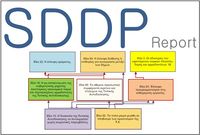SDDP Economic Integration - Vision, July 2007 (1st co-laboratory)
SDDP_Economic Integration- Vision
|
Executive Summary
Twenty-one business and economics stakeholder representatives with diverse perspectives and experiences participated at the three successive bi-communal workshops on 3, 10 and 27 July 2007. During the first workshop, which was dedicated to jointly visualise and describe the desired situation, i.e. the envisioned Cyprus with respect to economic integration and free movement of goods and services within Cyprus and the EU. Economics and business experts identified 48 factors that describe the benefits / opportunities for Cyprus of free movement of goods and services. The second workshop aimed at identifying the current situation with its obstacles and perceived threats in achieving the envisioned Cyprus—economic integration and free movement of goods and services within Cyprus and the EU. The stakeholder representatives identified 62 of these obstacles and perceived threats. During the final workshop, economics and business experts proposed 27 actions to achieve economic integration in Cyprus and therefore to both overcome the obstacles and to reap the benefits in achieving free movements of goods and services within Cyprus and the EU. The stakeholder representatives were engaged in dialogue sessions that were designed and conducted employing the Structured Dialogic Design Process founded in systems sciences.
Triggering Question
In total, three bi-communal co-laboratories took place in July 2007. For the first one, The Economic Integration co-laboratory – Desired Situation envisioned the ideal model of Economic Integration, the triggering question that was tackled was:
- “With the aim of economic integration, what are the benefits (opportunities) for Cyprus of free movement of goods and services within Cyprus and the EU?”
Results
Experts participating in this co-laboratory were asked to visualize the ideal scenario of Economic Integration. At Holiday Inn Hotel, stakeholder representatives engaged for three hours in a structured dialogue focusing on the triggering question:
“With the aim of economic integration, what are the benefits (opportunities) for Cyprus of free movement of goods and services within Cyprus and the EU?”
In response to the TQ, the participants, economics and business experts, came up with 48 factors (descriptors), which were categorized in 10 clusters. Following the voting process, 16 descriptors received two or more votes, but only 3 dominant statements, received 5 or more votes and those were:
Statement #4,Involvement in common economical interests will lead to development of better social dialogue (7 Votes).
Statement # 27, Cooperation will provide greater understanding generating greater confidence in the relationships (6 Votes).
Statement # 25, Economic parity will remove obstacles to unification, especially fears of GCs that they will have to bear the financial burden & fears of TCs that they will be absorbed by the economically stronger GCs (5 Votes).
Interpretation of the Results
At the end of the voting, it was shown that 29 descriptors received one or more votes. If the same five descriptors had received all votes, then there would be a 100% agreement among the members of the stakeholder representatives group in terms of relative importance of the proposed descriptors of the desired situation of economic integration and free movement of goods and services within Cyprus and the EU. Because 29 descriptors received at least one vote, there exists a perceptible disagreement. The degree of disagreement in terms of preference voting, i.e. in terms of relative importance of the proposed descriptors, is an indicator of the complexity of the situation, which leads to a need to engage a stakeholder group in a structured dialogue about economic integration in Cyprus.
On the other hand, level of agreement on the above factors (factor 4, 27 and 25) is undeniable, when considering that 41.2% of the participants (7/17) in the first session had voted for factor 4, whereas, 35.3 % and 29.4% had voted for factors 27 and 25 respectively. This level of agreement is in fact a starting point for a common vision to be built upon.
Methodology
The workshop will be conducted through the methodology of "Structured Dialogic Design Process" (Structured Dialogic Design Process, SDDP) known as Structured Democratic Dialogue. The SDDP allows the team involved to discuss an issue with a structured and democratic way that allows us to achieve practical results. It is a deeply reasoned, scientific, psycho-social methodology has evolved over the past 30 years in its current form. Helps build consensus and solve complex problems.
The SDDP workshops contribute the following ways:
- To help participants reach a common understanding of the problem.
- To uncover the root causes (roots of the problem).
- Contribute to the consensual adoption of action plans.
- To create groups dedicated to the implementation of projects.
- to establish lasting ties based on respect, trust, and cooperation.
The SDDP workshops achieve these results through respecting the autonomy of all participants and the use of a toolkit consensus including discipline, technology, and graphics ideas that allow participants to control the discussion. The SDDP methodology developed to help understand and solve complex social systems (complex societal systems). It has been adopted successfully around the world in situations of uncertainty and conflict. At European level, the method has been used by four European networks of experts with participation of about 20 countries each time.
Organizers and partners
The Facilitation Team of these economic integration workshops consisted of:Aleco Christakis, Derya Beyatli, Kevin Dye, Andros Karayiannis, Tatjana Taraszow,and Ilke Dagli
